Long Beach floats proposed $93.5 million budget
City's spending plan stays within state tax cap
The city floated its proposed budget for the upcoming fiscal year, and while the $93.5 million spending plan was touted as the administration’s sixth consecutive balanced budget, homeowners could see a $142 increase in taxes and fees.
The proposed spending plan, which the City Council has yet to approve and could change at the May 16 meeting, stays within the state’s 1.26 percent tax cap. Officials said that the average homeowner would see a tax increase of $56, while annual water and sewer fees would increase by $26 and $60, respectively.
At a May 2 budget hearing, City Manager Jack Schnirman, a Democrat who is running for Nassau County comptroller, again cited the staggering $14.7 million deficit the administration inherited upon taking office in 2012, and noted improved financial controls the city implemented over the past five years that led to a $24.2 million turnaround and credit rating upgrades from Moody’s Investors Service that he said is saving taxpayers more than $200,000 in debt-related interest costs.
“After facing near bankruptcy a little over five years ago, we brought in a series of reforms that ultimately led to the city restoring its rainy day fund,” Schnirman said. “This year, we’re currently looking at a [reserve] fund balance of approximately $9.4 million, which we’re judiciously using to pay for the previous administration’s deficit.”
Last year, the council voted 3-2 to approve the current $90.1 million spending plan, which included a 2 percent tax hike and a separate 4.3 percent tax surcharge to cover the remainder of a $20 million judgment the city must pay to two former owners of the Superblock property — unrelated to iStar — to resolve a decades-old lawsuit, which found that the city undervalued the property when it purchased it through eminent domain. Once the judgment is paid off in 15 years, officials said that the surcharge would be removed from residents’ tax bills.
The proposed budget includes a $1 million increase on the city’s debt service, which the officials attributed to a $15.6 million bond the city approved last year to cover the remaining balance of the Superblock judgment.
John Bendo, president of the West End Neighbors Civic Association, said that the city’s debt has increased over the past several years.
“We now spend over 13 cents out of every dollar the city takes in servicing the debt and it’s increasing every year — that’s just an unsustainable path,” said John Bendo, president of the West End Neighbors Civic Association. “I know we like to talk about the fiscal mess that was inherited. The problem is you don’t want to leave a fiscal mess for those who will follow you.”
Schnirman said that Moody’s has called the city’s debt burden “manageable.” State Comptroller Tom DiNapoli's office said in a review of the budget last week that "significant revenue and expenditure projections in the proposed budget are reasonable."
Councilman Scott Mandel, who is up for re-election this year, noted a 2 percent increase in the water and sewer fund and called on the city to see if it could be reduced.
The budget includes a 1 percent raise for management employees, who Schnirman said continue to contribute 10 percent to their health care costs. And though contractual salary raises increased by $228,000, officials said that the recent contract agreement that the city reached with the Civil Service Employees Association will net the city $400,000 in cost-savings in contractual salary raises
in the upcoming fiscal year. The city also said that annual cost-savings from early-retirement and separation incentives initiated in 2012 total $2 million.
Health care costs are also up $1 million while retirement and pension costs have spiked by $350,500. The city said that the New York State Retirement System has recently made changes that will provide a stable projection of the city’s annual pension costs going forward, and the proposed budget reflects $190,000 in savings.
The city also noted that the proposed spending plan reduced requested budgets by $2.1 million, but does not reflect any significant service cuts or expansions.

 49.0°,
Fog/Mist
49.0°,
Fog/Mist 




